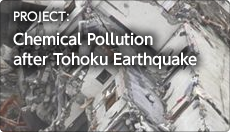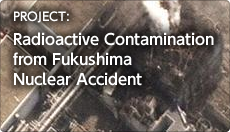
Jul,2009 : Basic Law on Chemicals Policy
Mar 19, 2012
Network for a Basic Law on Chemicals Policy(ChemiNet)
Past Activities of NGOs
Our civil groups and NGOs working on chemicals problems jointly held International Citizens Seminars on EU’s new chemicals policy in November 2004 and September 2005 ahead of the Japanese government. We adopted ‘the Tokyo Declaration against Chemicals Pollution on Earth’ and submitted it with some 20,000 signatures to the government on November 7, 2005. We demand to:
(1)based on the precautionary principle, promote substitution of safer chemicals and other materials;
(2)stop continuing use of chemicals which may not be safe;
(3)shift the burden of proof of safety from the government to businesses, extending the producer responsibility such as the polluter-pays principle;
(4)guarantee the public’s right to know, including disclosure of information on chemicals in products;
(5)institutionalize citizens’ participation in decision-making on regulation and other policies to immediately start a comprehensive review of the chemical regulation system.
In December 2006, we submitted to relevant ministries and agencies ‘Citizens’ Proposal on Management of Chemicals’ concerning:
(1)a basic direction of chemicals management;
(2)collection and transmission of information on chemicals;
(3)the full-scale introduction of Globally Harmonized System of Classification and Labelling of Chemicals (GHS);
(4)measures for managing chemicals;
(5)risk assessment and management;
(6)a relief system for new harm;
(7)how to respond to new challenges.
Formation of Network for ‘a Basic Law on Chemicals Policy’(ChemiNet)
In January 2008, Japan’s Environment Ministry and Health, Labour and Welfare Ministry and Economy, Trade and Industry ministry jointly started reviewing the Act on the Evaluation of Chemical Substances and Regulation of Their Manufacture, etc.(JCSCA). The existing chemicals policy varies by usage or field due to sectionalism among ministries. The countermeasures are also inconsistent because each ministry takes them differently. For example, measures against sick building syndrome vary depending on the ministry: the Health, Labour and Welfare Ministry established risk guideline values for the indoor concentrations of 13 materials, which are not enforceable; the Land, Infrastructure and Transportation Ministry controls only 2 materials by the Building Standard Law; the Education, Culture, Sports, Science and Technology Ministry which oversees the School Environmental Health Standards requires periodic inspections of only 6 materials. Moreover, there are ‘gaps’ among regulations. For example, household insecticides are not subject to the Agricultural Chemicals Regulation Law even though they have the same ingredients as the subject chemicals, and while the insecticides against sanitary insects including flies and ants are regulated as quasi-drugs by the Pharmaceutical Affairs Law, the insecticides against nuisances including termites are not directly regulated by any law. Our civil groups and NGOs working on chemicals problems took this opportunity to form a new network ‘Network for a Basic Law on Chemicals Policy’(ChemiNet) on June 7th. As of January 2009, the participant groups are 16. We highly recommend implementing a fundamental review of the existing chemicals policy which reflects sectionalism among ministries, and creating a three-stage legal structure: The first is ‘a Basic Law on Chemicals Policy’ providing for the basic principles and strategies on chemicals management and the integrated management of chemicals; the second is ‘a Fundamental Law of Chemicals’ into which JCSCA, the Pollutant Release and Transfer Register (PRTR) Law and laws concerning hazard management such as information disclosure and labeling are integrated; the third are individual laws related to field-specific risk management.
Activities After Formation of ChemiNet
We have called for other civil groups to join and support us. In November, we began to collect group signatures for ‘a Basic Law on Chemicals Policy’ to be enacted and individual ones on a petition to the Diet. At the end of December, our leaflets for the public were produced to seek the signatures. Furthermore, we reviewed the proposal for ‘a Basic Law on Chemicals Policy’ drafted by People’s Association on Countermeasures of Dioxin&Endocrine Disruptors, based on which, we ChemiNet proposed ‘a Basic Law on Chemicals Policy’. On November 8th, we held a symposium to discuss the necessity for ‘a Basic Law on Chemicals Policy’ etc. On the 25th of the same month, we also held a study session with 17 lawmakers (including substitutes) in the Diet Members’ Building.
Please, pay attention to our activities and cooperate in enacting ‘a Basic Law on Chemicals Policy’
‘A Basic Law on Chemicals Policy’ has8_basic_principles:
1.shifting to manufacture and use of chemicals for a sustainable society ― reduction of total amount of chemicals;
2.risk assessment of pre-market chemicals ― ‘no data, no market’ principle;
3.taking into consideration people (such as fetuses and children) and ecosystems vulnerable to chemicals;
4.appropriate management of chemicals throughout their entire lifecycle (from research and development, manufacture, use and recycling to disposal) ― lifecycle management;
5.taking countermeasures even though scientific knowledge is not enough ― precautionary approach;
6.substitution of low-risk chemicals for high-risk ones ― promotion of substitution;
7.involving all concerned in formulating measures ― collaboration principle;
8.formulating measures under international cooperation ― international cooperation.


